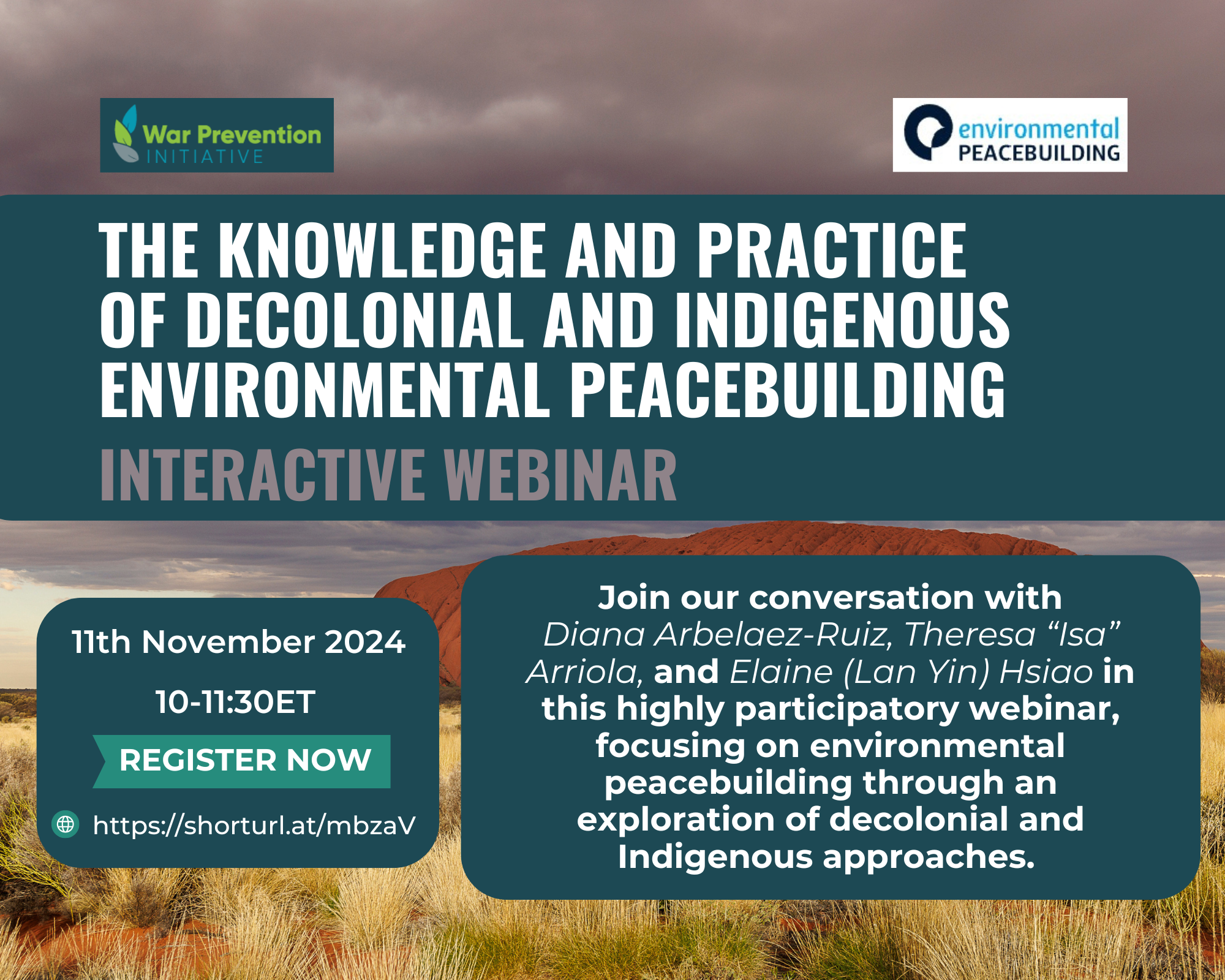Event date: November 11, 2024
Hosted by War Prevention Initiative and the Environmental Peacebuilding Association
In 2024, the War Prevention Initiative and the Environmental Peacebuilding Association released a Peace Science Digest Special Issue on Decolonial and Indigenous Approaches to Environmental Peacebuilding. This event was designed as a highly participatory, complimentary conversation to the special issue. The panel was facilitated by Kelsey Coolidge (WPI) and featured remarks by speakers Dr. Theresa “Isa” Arriola and Dr. Elaine (Lan Yin) Hsiao. Key points and reflections from the conversation are detailed below.
- The status quo, militarist paradigm and approach to security “is killing us all.” Examples include mass human loss and suffering resulting from wars, conflict, and past/ongoing genocide(s) of Indigenous peoples; and environmental deregulation, conservation, and environmental efforts that are confined in a militarist logic. There is a sense of urgency for peacebuilding efforts to be reclaimed by Indigenous peoples—who oftentimes already bear the burden of “what’s left” in post-conflict/extraction/degradation of the environment. There should be a rejection of the national-militarized-security paradigm and a transformation into a “genuine security.”
- Capitalism, militarism, and patriarchy (all facets of white supremacy) are the main barriers to meaningful peacebuilding activities. Those systems, unchallenged, will continue to perpetuate harm and violence, particularly to those who are already in a state of dispossession/vulnerability. It is therefore imperative to ‘denaturalize’ (i.e. question/scrutinize) the paradigm, framing, language and overall approach to (environmental) peacebuilding activities.
- Decolonizing peacebuilding efforts and decolonizing wealth go hand in hand, as the focal point of both is to address systemic inequalities. At present, a lot of the funding and representation within peacebuilding efforts come from the Global North, as wealth and power has been accumulated over the last century. What would it look like to (re)distribute that power and ensure a more just representation of Indigenous populations, and the global community?
- Recognition of past and ongoing harms upon Indigenous populations is vital for meaningful ways forward in environmental peacebuilding efforts, as the only way to establish justice is to be able to acknowledge, first and foremost, where the injustice has been and is being perpetrated. Land recognition, particularly within the U.S. where there is no truth and reconciliation process, is paramount as a first step in being able to address the settler-colonial legacy that the nation was built upon. When these legacies are not confronted, the upholding and perpetuation of violence and injustice(s) both within the U.S. and abroad will continue. This very same reason is why (global) ‘Land back’ movements are seen as inherently part of the decolonization of environmental peacebuilding efforts.
- True decolonization efforts threaten and confront the status quo, power, and where power has historically been situated—thereby inherently affecting/disrupting the privileged. Resistance comes in various forms and should be empowered. There is a calling and an opportunity to sit with the discomfort/resistance that one may feel in relationship to this reality. ‘Good intentions’ may not be enough to move the needle and establish positive peace/true justice.
- Silos should be broken down. Environmental peacebuilding efforts should be approached collaboratively and be all inclusive, given that it’s an intersectional endeavor that affects the entirety of the planet. The way forward is one that centers co-creation and radical hope— flipping the script of a “climate crisis” into one of reimagination and endless opportunity.

